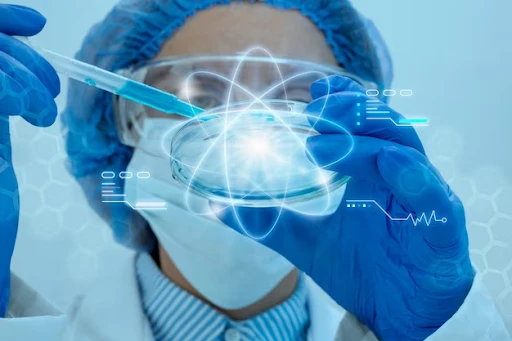The intersection of health and technology, commonly referred to as “health-tech,” is experiencing a profound transformation in the healthcare industry due to unprecedented technological advancements. This seamless fusion is giving rise to cutting-edge innovations that are redefining patient care, diagnosis, treatment, and overall well-being. In this detailed examination, we dive into the intricate connection between health and technology, highlighting the most significant developments, advantages, challenges, and the potential for a healthier future.
The Rise of Health-Tech

The Rise of Healthcare signifies a transformative shift in healthcare, blending advanced technology with personalized wellness. From wearable devices monitoring vital signs to telemedicine connecting patients with doctors globally, this evolution prioritizes preventive care and empowers individuals to take charge of their well-being, heralding a new era in healthcare innovation.
Let’s take a look at some of the health-techs that have emerged in recent times:
Digital Health Records
Simplifying patient data and enabling smooth provider contact are made possible in large part by electronic health records. This innovation not only enhances efficiency but also contributes to more informed decision-making.
Telemedicine
Virtual consultations and remote monitoring represent a pivotal stride in extending healthcare services, especially to underserved areas. This paradigm shift ensures broader access to medical expertise and fosters a more inclusive healthcare ecosystem.
Wearable Devices
Wearable technology, including fitness trackers, smartwatches, and health applications, is enabling people to monitor their health and fitness, making it an essential tool for proactive health management.
Health Monitoring
The Internet of Things (IoT) devices, through real-time data collection on vital signs, chronic conditions, and medication adherence, are transforming how healthcare providers deliver personalized and timely interventions.
Genomic Medicine
Precision healthcare has entered a new age because of advances in genetics and DNA sequencing, which have made tailored medicine and targeted therapies possible.
Enhancing Patient Care

Enhancing patient care involves optimizing medical services to prioritize patient well-being. This encompasses personalized treatment plans, improved communication between healthcare providers, and leveraging innovative technologies for accurate diagnoses. By fostering a compassionate and collaborative healthcare environment, the focus shifts towards delivering more effective and holistic care, ultimately benefiting patients.
Following are some of the patient care that had a significant impact on the healthcare industry:
Remote Patient Monitoring
Real-time monitoring of chronic patients enables early intervention, reducing hospitalizations, and significantly improving patient outcomes.
Telehealth Services
Virtual consultations not only improve access to specialists but also reduce travel time, enhancing follow-up care and patient satisfaction.
Predictive Analytics
AI-driven algorithms analyzing patient data allow for the prediction of disease trends, fostering proactive healthcare strategies and personalized care plans.
Precision Medicine
Tailoring treatments based on genetic and molecular insights optimizes therapeutic outcomes, marking a significant leap in individualized patient care.
Technological Innovations in Diagnosis and Treatment

The detection and treatment of medical conditions have been transformed by recent technological advancements. Advanced imaging techniques, like MRI and CT scans, provide detailed insights, enabling precise diagnoses. Additionally, breakthroughs in personalized medicine, gene therapy, and telemedicine enhance treatment effectiveness, tailoring medical interventions to individual needs. These innovations promise a future of more accurate and targeted healthcare.
Medical Imaging: High-resolution imaging technologies aid in early and accurate disease detection, revolutionizing diagnostic processes.
Robot-Assisted Surgery: Surgical robots, by enhancing precision and minimizing invasiveness, are redefining the landscape of surgeries, ensuring faster patient recovery.
Drug Discovery: AI and machine learning applications accelerate drug development, predicting potential drug interactions and identifying novel compounds with unprecedented efficiency.
Patient Empowerment and Engagement

Patient empowerment and engagement are pivotal in healthcare, fostering collaboration between healthcare providers and individuals. Empowered patients actively participate in decisions about their health, leading to better outcomes. By promoting education, communication, and shared decision-making, healthcare becomes a collaborative effort, improving people’s general health and the efficiency of healthcare systems.
Health Apps and Wearables
With the help of several wearable technology and health applications, people are taking charge of their health by recording their activities, keeping an eye on their nutrition, and creating health goals.
Health Education
Patients who have access to reliable medical information are better equipped to make decisions about their health and are encouraged to take a more proactive and knowledgeable approach to their well-being.
Mental Health Support
Teletherapy and mental health apps provide discreet and accessible support for emotional well-being, addressing a critical aspect of holistic health.
Challenges and Ethical Considerations

In the context of the digitally linked healthcare system, protecting sensitive patient data is of utmost importance and calls for strong data protection protocols. It is crucial to close the digital gap in order to guarantee that everyone can take advantage of health-tech breakthroughs, underscoring the need for fair access to medical progress. Maintaining patient safety still requires finding a careful balance between encouraging innovation and putting devices through thorough testing. This emphasizes the ethical obligation that permeates the whole health-tech ecosystem, where innovations must adhere to the strictest integrity and safety requirements.
The Future of Health-tech

The future of HealthTech promises groundbreaking advancements in personalized medicine, remote patient monitoring, and artificial intelligence-driven diagnostics. Innovations like wearable health devices, telemedicine platforms, and precision therapies are revolutionizing healthcare delivery. Future developments in technology integration might improve patient outcomes, optimize workflows, and provide a healthcare system that is more focused on the needs of the patient.
The technologies that might make their way to the healthcare industry include:
Blockchain
Decentralized and secure data management through blockchain technology has the potential to transform health records and data sharing, ushering in a new era of transparency and trust.
Artificial Intelligence
The future of health-tech will witness increasingly sophisticated AI-driven diagnostics and treatment recommendations, revolutionizing the precision and efficiency of healthcare delivery.
Virtual Reality
Applications of virtual reality in pain management, physical therapy, and medical training hold promise for the future, providing innovative solutions to longstanding challenges in healthcare.
Wrapping It Up!
The healthcare industry is changing at a rate never seen before as technology and health become more intertwined. Healthtech innovations hold the promise of improving patient outcomes, reducing healthcare costs, and empowering individuals to take control of their health. Navigating the intricate interplay between innovation, ethics, and regulation, the fusion of health and technology offers a glimpse into a future where healthcare is more personalized, accessible, and effective than ever before.

